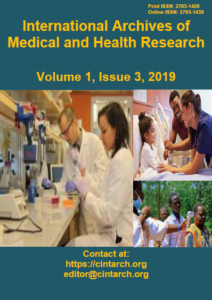
International Archives of Medical and Health Research (IAMHR), pISSN: 2705-1420; eISSN: 2705-1439
September to October 2019 Vol 1(3): pp.43-50 DOI: https://doi.org/10.33515/iamhr/2019.015/13
Copyright © 2019 C-International Archives
Original Article
Perception of illness and health seeking behavior among Fulani in Wamakko Local Government Area of Sokoto State, Nigeria
Fatima A. Falaki1*, Ridwan M. Jega2
1Department of Family Medicine, Usmanu Danfodiyo University Teaching Hospital, Sokoto, Nigeria
2Department of Paediatrics, Usmanu Danfodiyo University Teaching Hospital, Sokoto, Nigeria
*Corresponding Author’s Email: faatifalaks@gmail.com
Published November 18, 2019
ABSTRACT
Background: Several studies have established strong links between individual’s health seeking behavior and perception of illness, as well as accessibility to healthcare services. Aim: This study aimed to assess the perception of illness, and health seeking behavior of Fulani in Wamakko Local Government Area, Sokoto State, Nigeria. Materials and Methods: A cross-sectional study conducted among 390 semi-normadic Fulani (selected by multistage sampling technique) in rural communities of Wamakko LGA, Sokoto State, Nigeria. A semi-structured pretested interviewer-administered questionnaire was used to obtain information on the research variables. Data were analyzed using IBM SPSS version 17 statistical computer software package. Results: More than two-thirds 270 (69.2%) of the 390 respondents had no formal education. Two hundred and thirty-nine (61.3%) wrongly perceived illness to be from God, while 145 (37.2%) and 167 (42.8%) sought care in health facilities for themselves and their children respectively. Of the 172 female respondents, only 37 (21.5%) and 32 (18.6%) had their pregnancy supervised and their last delivery in a health facility respectively, with the main obstacles being financial constraints, poor physical access, and lack of approval by their husbands. Most 282 (72.3%) of the 390 respondents did not take their youngest child to the hospital for immunization at all. Conclusion: Majority of the respondents in this study wrongly perceived illness to be naturally from God, and utilization of healthcare services was poor among them. Government should give education of the Fulani girl child top priority and make healthcare services more accessible to this vulnerable population.

